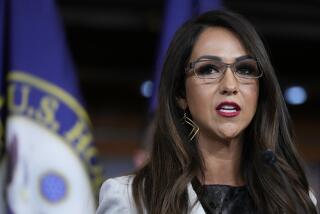COLUMN RIGHT/ VIRGINIA I. POSTREL : A Conflict for the Governor? Have a Cookie : A politician whose spouse works will be exposed to the ‘real’ world; is that bad?
- Share via
Hillary Clinton is right. The choice really is between cookies and conflicts of interests.
The reason for that choice, however, has little to do with sex roles. As long as government subsidies, contracts and regulations extend into every aspect of the economy, any political spouse with a job represents a potential conflict of interest. And in a political climate where it’s easier to produce scandals than to argue principles, working spouses provide easy targets.
In the tight world of Little Rock power brokers, the Clintons may well have crossed the line into full-blown favor-trading. Clients will tend to seek out a lawyer or investment banker whose spouse has the power to write tax exemptions, choose a broker for state bonds or call off zealous regulators. Quite a few spouses of politicians work in the deal-making world where political power matters. But it isn’t necessary to be a lawyer entangled in state business to have your career cast doubt on your officeholder spouse’s motives.
Suppose, for instance, that Hillary Clinton were a high-school English teacher. Wouldn’t there have been charges that her professional interests influenced Bill Clinton’s education reforms in Arkansas, which included more money for public schools?
Or suppose Hillary Clinton, like former primary candidate Bob Kerrey, had owned a chain of restaurants. Ordinary restaurant business practices, including scanty health insurance for employees, would dog the Clintons, as they did Kerrey. And the occasional labor-law violation--letting teen-agers work late nights, for instance--would become grist for the opposition’s mills. Any proposal to subsidize health insurance for small businesses or to revise service-industry laws would look like a conflict of interest.
Finally, suppose Hillary Clinton owned a specialty-chemical company, as does Al Hubbard, executive director of the President’s Council on Competitiveness. Her husband’s political opponents would seek to discredit his regulatory policies, just as environmentalists have attacked Hubbard--even if, as in the case of Hubbard, the company in question were affected only in the most general way as a manufacturer subject to regulation.
In theory, we’d like a political appointee directing a “competitiveness council” to know something about how industry competes. And, in theory, we’d like our elected officials to know more about the nonpolitical world. Working spouses can give politicians a valuable window into the world where children are educated, the sick are treated and wealth is produced. With that workaday perspective, lawmakers might be less likely to impose one-size-fits-all governmental “solutions” on complex systems. At the very least, they would have more information on which to base their policies.
But that insight seems incompatible with our highly tuned sense of political ethics. As long as government is entangled in economic life, an outsider perspective will remain a political rarity. Few professionals are willing to undergo the kind of scrutiny that made investment banker Richard Blum’s client list fodder for negative headlines during his wife Dianne Feinstein’s gubernatorial campaign. As long as spouses of politicians can be a conduit for political favors, conflict of interest will remain a valid public concern.
Until recently, it looked as if political spouses had found one way to avoid the conflicted intersection of public and private business: employment by the government. Sen. Bob Dole and Elizabeth Dole, Sen. Phil Gramm and Wendy Gramm, or Maine Gov. John R. McKernan Jr. and Rep. Olympia J. Snowe exemplify this strategy: both spouses pursuing high-profile, high-powered careers without facing charges of conflict of interest. But politically, that has its pitfalls. A member of Congress worried about preserving a military base in his district might, for instance, think twice about zinging the National Endowment for the Humanities, headed by Lynne Cheney, the wife of Defense Secretary Dick Cheney.
Barring a radical change in our sense of right and wrong, therefore, there appear to be only two ways to reconcile politics and marriage. We can cut back government’s power to regulate and to dispense favors. Or we can go back to what’s safe: cookies and tea.
More to Read
Get the L.A. Times Politics newsletter
Deeply reported insights into legislation, politics and policy from Sacramento, Washington and beyond. In your inbox twice per week.
You may occasionally receive promotional content from the Los Angeles Times.










